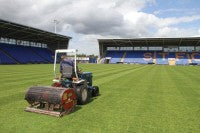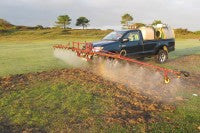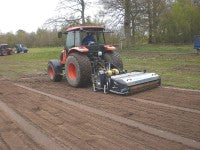Bringing in Expert Assistance
 In straitened economic times, it can be difficult to justify obtaining resources to outsource work, and a lot of managers will be told that they need to try to undertake the job themselves. This is a double-edged sword; in struggling to undertake a new task we develop fresh skills, but it can also reduce the flow of new ideas and tie up resources that might be more usefully employed elsewhere .
In straitened economic times, it can be difficult to justify obtaining resources to outsource work, and a lot of managers will be told that they need to try to undertake the job themselves. This is a double-edged sword; in struggling to undertake a new task we develop fresh skills, but it can also reduce the flow of new ideas and tie up resources that might be more usefully employed elsewhere .
The best facility managers have the confidence to acknowledge that they can't do everything. They understand that 'knowing a man who can' is probably more important. So, who do the top venues trust to undertake work on their facilities and what do they stand to benefit by allowing strangers to carry out contract work?
It is inherent in our nature not to trust strangers, particularly itinerant workers. We develop relationships; that builds trust. This is hard to do with individuals who we only see occasionally, but not impossible. Managers can learn a lot from people who regularly get to work at other facilities. Trusting other people takes time, but it may be worth doing.
This is a good time of the year to walk over your venue with them and pick their brains; they may come up with ideas that can help earn or save you money.
 Seeing the same venue day-in and day-out can prevent you looking at it objectively; as a manager, you can be too close to the action to make difficult decisions. Occasionally, renovations at the end of a season may need to be damaging to the surface to be beneficial in the long-term and create a better surface for the start of the next playing season.
Seeing the same venue day-in and day-out can prevent you looking at it objectively; as a manager, you can be too close to the action to make difficult decisions. Occasionally, renovations at the end of a season may need to be damaging to the surface to be beneficial in the long-term and create a better surface for the start of the next playing season.
Managers can be reticent to upset members, and this is where contractors are commonly called upon to be more objective and prepared to do the work that's going to resolve the underlying problems.
The equipment used by machinery contractors is often more reliable as it is used more often and, consequently, serviced and maintained more frequently. It more often complies with the latest Health and Safety legislation than machinery only used occasionally.
 The machinery used by a contractor is often better suited to undertaking the job more effectively, thereby reducing inconvenience to customers. For example, a golf course manager may have the option of employing a specialist contractor to apply a herbicide to the fairways with a machine that has turf tyres, 1000 litre tank and a 9 metre boom fitted with blob markers and a rinse tank all within a few hours; or alternatively, they might consider using their own 200 litre, 3 metre boom sprayer that is occasionally mounted on course machinery, thereby taking up considerably more time and resources to undertake the same job less effectively when considering ideal spray windows.
The machinery used by a contractor is often better suited to undertaking the job more effectively, thereby reducing inconvenience to customers. For example, a golf course manager may have the option of employing a specialist contractor to apply a herbicide to the fairways with a machine that has turf tyres, 1000 litre tank and a 9 metre boom fitted with blob markers and a rinse tank all within a few hours; or alternatively, they might consider using their own 200 litre, 3 metre boom sprayer that is occasionally mounted on course machinery, thereby taking up considerably more time and resources to undertake the same job less effectively when considering ideal spray windows.
Using a contractor can provide you with access to machinery that might fall outside your budget. Verti-drains can cost between £30,000 and £45,000, and that's before the maintenance costs. It still costs £2,500 to have all the fairways of a golf club aerated, regardless of whether the machine breaks down. Being a contractor's machine, the club gets the benefits without the problems. A fairway mower, costing the equivalent of a verti-drain, is likely to be used almost every day, providing better return on investment than on a machine that might get used only once or twice a year.
 Course managers are often critical of golf club members who refuse to see that the most qualified person to manage their course is their full-time employee; however, course managers are equally reluctant to hand responsibility over to contractors who specialise in their field. It takes courage and confidence to develop partnerships. A good contractor is proud of the work they undertake and will stand by it.
Course managers are often critical of golf club members who refuse to see that the most qualified person to manage their course is their full-time employee; however, course managers are equally reluctant to hand responsibility over to contractors who specialise in their field. It takes courage and confidence to develop partnerships. A good contractor is proud of the work they undertake and will stand by it.
It's easy to see how useful that relationship can be for the course manager. One contractor told me of situations where he and his colleagues regularly arrive, discuss the scheduled work and that is the last they see of the manager until shortly before they depart. There have been other situations where they start work before the greenstaff, which means they are able to keep ahead of the club members, again only seeing the course manager on departure.
Time and again, managers specify the technician that came last time because they did a great job, and why shouldn't they? Practice makes perfect, and somebody who spends lots of time in different situations on a machine is bound to be able to get the best out of it.
